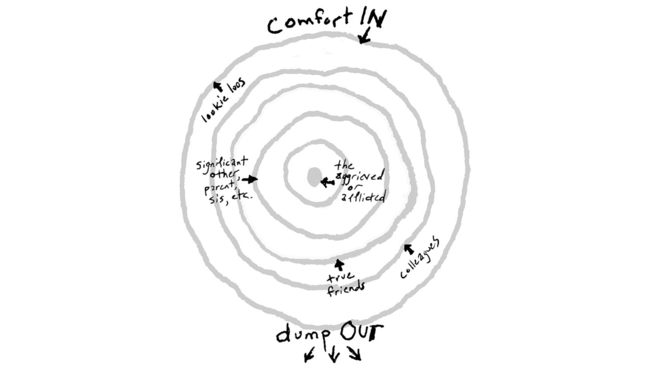How To Help A Grieving Friend: Beyond The Basics
/ Supporting a Griever : Litsa Williams
This isn't our first post on how to support a friend who is grieving. It probably won't be our last. But we have a specific goal today. We want to provide a one-stop-'Beyond the Basics'-shop for those looking to better help a friend who is grieving. Today we are rounding up all of our past articles on helping a grieving friend, adding some traps we have seen even the most well-intentioned friends fall into with tips on how to avoid them, and sharing some of our favorite advice from others to help you reach 'grief-friend' status in a jiffy.
To kick off your course on how to be a good grief-friend, take a look back through all our articles on the many facets of helping a grieving friend. We didn't say this was going to be quick. Learning to be a good grief-friend takes some time. But you've shown up here to get some info, which is a good sign that you're a caring friend who is willing to put in the time to make sure you're there when you're needed most.
Phew, with all those posts you might be wondering what else we would possibly want to say about supporting someone. A lot of the tips above have to do with what to say or not say, things to do, or what approach to take. Today we want to also highlight ways people get into trouble, thinking they are being helpful when they are . . . not. And what you can do instead. Since we have provided you with plenty of extra reading material above, we will try to keep this short and to the point.
What NOT to do: Assume your friend needs 'space'.
Now, this isn't to say that people never need space. Sometimes they do. It is to say that many times people don't need space, they need support, and they feel like everyone has abandoned them. Often times giving space is a product of not knowing what to say or do, being worried you're going to make it worse, or just feeling uncomfortable. It is convenient to think maybe what the person NEEDS is for you to steer clear, I know. But it is never okay to assume, and with all those great articles above you are probably feeling a lot better equipped to be a support.
What to do instead: ASK them if they need space.
Revelatory, right? Just ask! 'Am I bothering you?' 'Am I checking in too much?' 'Am I not checking in enough?' 'I want to be there for you, but if you want me to back off and give you some space just say the word.' There are tons of ways to ask, so stop guessing and just do it.
What NOT to do: Assume what you would need/have needed is what they need.
We all do the rough times in life differently. Heck, sometimes we even do our own rough times differently. Maybe what you needed last time you went through something was someone to drag you out of the house. What they might need is someone to sit on the sofa with them in them in silence. You might have wanted someone to listen to you while you shared all your deepest feelings. They might need someone to help them clean their kitchen and do their laundry. If you have offered support and it has been declined, consider whether what your offering isn't what they need rather than assuming they don't need support at all.
What to do instead: ASK them what they need.
Now, I know this sounds like it flies in the face of 'be specific when you offer support' advice. We do suggest you start there - offering what you can think of specifically and have to offer. But if they decline those offers, we just want to add this step in before you throw in the towel and stop offering. A really simple, "Hey, I know you're not interested in any of my famous green bean casserole or my HBO go password or my offers to mow your lawn, but is there anything at all that you do need? Anything around your house that you don't have the energy to take care of or any errands you need run? I could just sit around with you if you ever need company' (I know, those are still specific-ish, but it might create space for them to think of w). If they still don't have anything, let them know you will keep checking in and ask them to please tell you if it gets annoying or to stop asking.
What NOT to do: Tell them how hard their grief is for you.
Now, if you are both grieving the same loss, sharing that grief and communicating about it is great. But if you are further removed from the loss, telling them how hard it is for you to see them struggling or how hard the loss is on you is usually not helpful. This doesn't mean it can't or shouldn't be hard on you, this just means they are not the person for you to be sharing that with.
What TO do: Support in, Dump out.
The simple-but-brilliant ring theory approach was made famous-ish in a 2013 LA Times Op-Ed by Susan Silk and Barry Goldman. You can check out the full article here, but the highlights of the theory are below:
Draw a circle. This is the center ring. In it, put the name of the person at the center of the current trauma. Now draw a larger circle around the first one . . . In that ring put the name of the person next closest to the trauma . . . Repeat the process as many times as you need to. In each larger ring put the next closest people. Parents and children before more distant relatives. Intimate friends in smaller rings, less intimate friends in larger ones. When you are done you have a Kvetching Order . . .
Here are the rules. The person in the center ring can say anything she wants to anyone, anywhere. She can kvetch and complain and whine and moan and curse the heavens and say, "Life is unfair" and "Why me?" That's the one payoff for being in the center ring.
Everyone else can say those things too, but only to people in larger rings.
When you are talking to a person in a ring smaller than yours, someone closer to the center of the crisis, the goal is to help. Listening is often more helpful than talking. But if you're going to open your mouth, ask yourself if what you are about to say is likely to provide comfort and support. If it isn't, don't say it. Don't, for example, give advice. People who are suffering from trauma don't need advice. They need comfort and support. So say, "I'm sorry" or "This must really be hard for you" or "Can I bring you a pot roast?" Don't say, "You should hear what happened to me" or "Here's what I would do if I were you." And don't say, "This is really bringing me down."
If you want to scream or cry or complain, if you want to tell someone how shocked you are or how icky you feel, or whine about how it reminds you of all the terrible things that have happened to you lately, that's fine. It's a perfectly normal response. Just do it to someone in a bigger ring.
Comfort IN. Dump OUT.
Good stuff, right? They even have a handy diagram by Wes Bausmith to go with it. I have never known anyone grieving to print, laminate, and give copies to all their friends, but I'm just sayin' it isn't the worst idea.
Alright, that's what we've got for today. Spread the word on how to better support people struggling - it makes our society a better place for us all to live and to grieve. And subscribe to get out all our new posts right to your inbox.
We wrote a book!
After writing online articles for What’s Your Grief
for over a decade, we finally wrote a tangible,
real-life book!
What’s Your Grief? Lists to Help you Through Any Loss is for people experiencing any type of loss. This book discusses some of the most common grief experiences and breaks down psychological concepts to help you understand your thoughts and emotions. It also shares useful coping tools, and helps the reader reflect on their unique relationship with grief and loss.
You can find What’s Your Grief? Lists to Help you Through Any Loss wherever you buy books:





